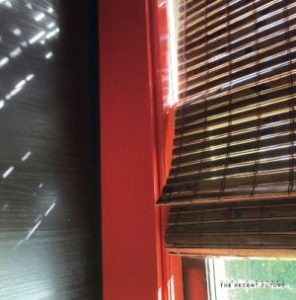 “A good songwriter writes good songs. A great songwriter writes overarching poetic narratives. The songwriter as lyric poet doesn’t just turn out albums or mixes, they weave myths that touch our collective soul and seem at once personal and in synch with the human zeitgeist. Alex McMurray is such a writer.”
“A good songwriter writes good songs. A great songwriter writes overarching poetic narratives. The songwriter as lyric poet doesn’t just turn out albums or mixes, they weave myths that touch our collective soul and seem at once personal and in synch with the human zeitgeist. Alex McMurray is such a writer.”
The late, great John Swenson said it best, as he so often did. The opening lines of his review of Road Songs (2020) for OffBeat, McMurray’s last album, distill the essence of his artful-dodger songcraft, which ponders the The Recent Future on his latest release. But while Road Songs painted tone poems of drifters and searchers with his consummate alt-folk palette, The Recent Future is a real ear-opener.
McMurray throws down the sonic gauntlet on the first track, “Saw Mill Baby,” a tour de force forged by his own one-man band, bassist Jason Jurzak, and superbly mixed effects, which dive through an echo chamber of voices to the lower depths: “In my dream I was so free / I was fifteen miles below the sea / where I can’t hear the gears a rust / it’s just me and the octopus.”
McMurray’s retro-futuristic vision comes full circle on “Crazy World,” the final track, slipping in and out of atonal dissonances in a funhouse mirror of instruments that includes loop-meister Helen Gillet on cello while a freak-show circus pulls up stakes before leaving us with the promise of an escape hatch: “Let’s slip out of this trap while the devil is napping /stranger things have certainly happened.”
Longtime McMurray aficionados—who, like myself, have been singing along with his always-clever, often-beautiful choruses for years—need not worry. Framed between those somewhat surprising sonic departures (which delighted this free jazz/new music maven), there’s plenty of the instant classics that keep fans hooked on Mr. Tuesday Night, the weekly streaming series McMurray launched in the early days of the pandemic, which remains as fresh as ever.
High on the instant-classic list: “Million O’Clock.” A paean to that hazy time between last call and after-hours when “the clock’s on the ceiling / the band’s on the floor,” the song paints a vivid picture of only-in-New-Orleans dive-bar denizens that is wistfully elegiac, drifting off on the wings of Glenn Hartman’s accordion. It’s also one of several tracks with McMurray’s trademark sing-along choruses, which Susan Cowsill’s harmonies make impossible to resist.
“Here at the End of the World,” which melds the microcosmic with the macrocosmic, is the album’s thematic and musical centerpiece. It ranges seamlessly from evocative meditations on “waiting for the fireworks show” at the grassy strip of levee behind the old graffitied naval base, where the Industrial Canal meets the Mississippi River, to a full-court orchestral press, powered by Jonathan Freilich’s horn and string arrangements, which invokes a horrific Judgment Day of our own creation: “Its a crashing and a dying everybody knows why / and we’ll all expire in the water and the fire / and we’re lost in the mud and the moon fills with blood /and the trumpet’s gonna sing through the heaven it rings / and Jesus come around said it’s all going down” he says, “it’s all on you.”
Yet somehow, against all odds, McMurray gleans a glimmer of redemption, Jesus be damned: “He’s gonna wash his hands / but maybe I got plans…”
The mere possibility of plans offers a way out as the song loops back to its lovely, intimate chorus: “Would you sit by me tonight? / you can still see a little bit of light / take our shoes off and dance real slow / while we wait for the fireworks show.”
There’s more, much more to contemplate on The Recent Future, which is perhaps even more “monumental” than John Swenson deemed Road Songs to be. And there’s no question it passes the Swenson test for great songwriters: “They weave myths that touch our collective soul and seem at once personal and in synch with the human zeitgeist.”




